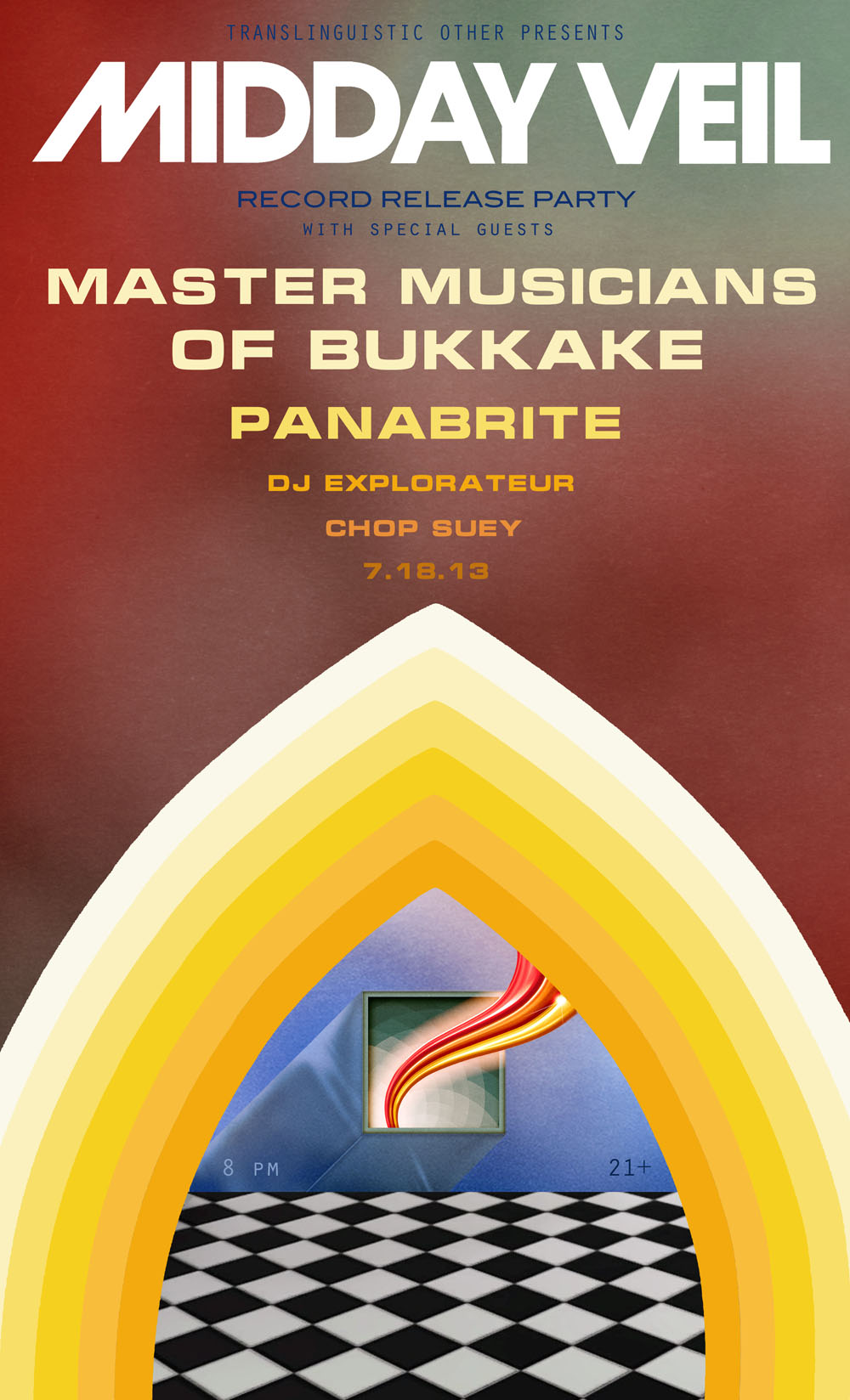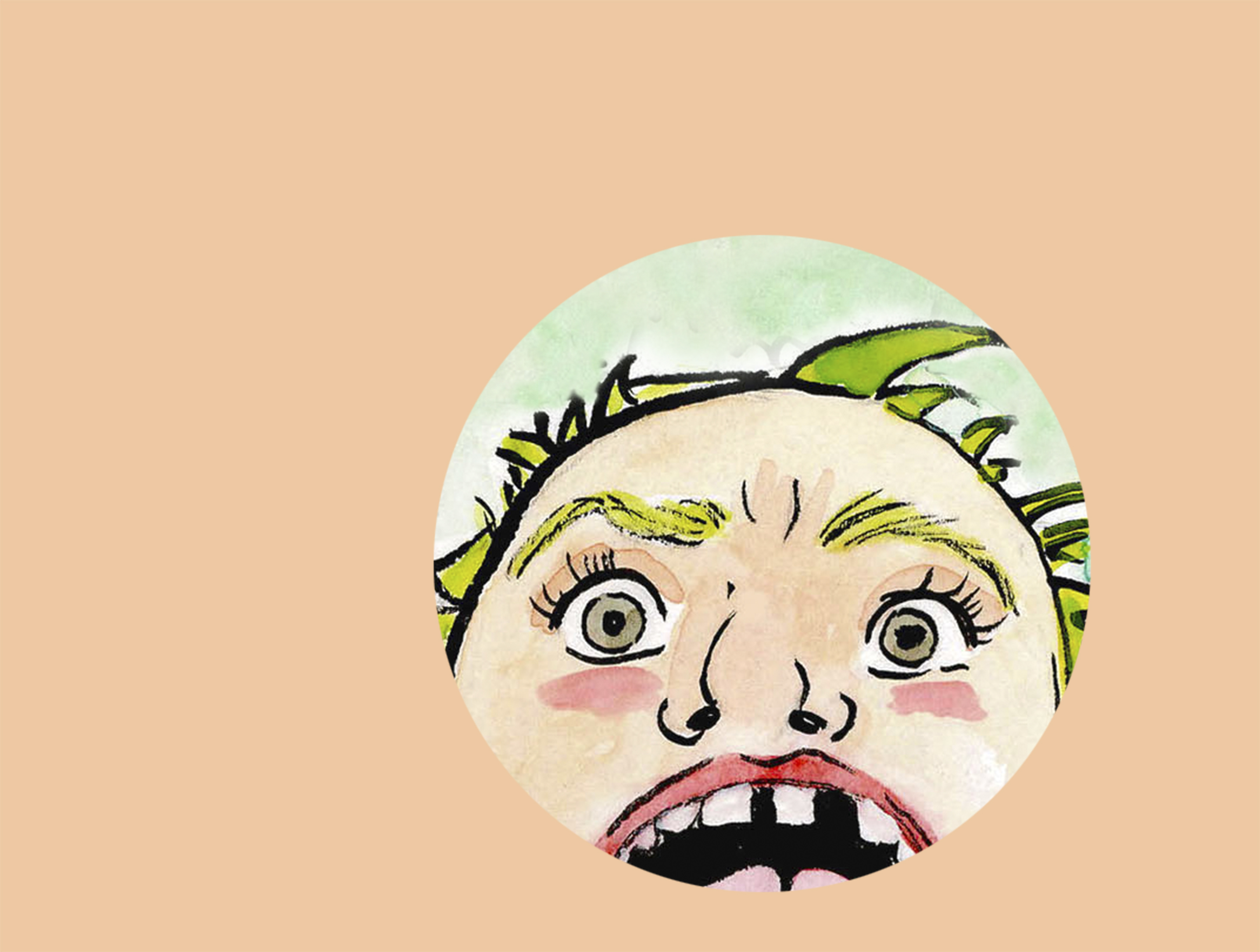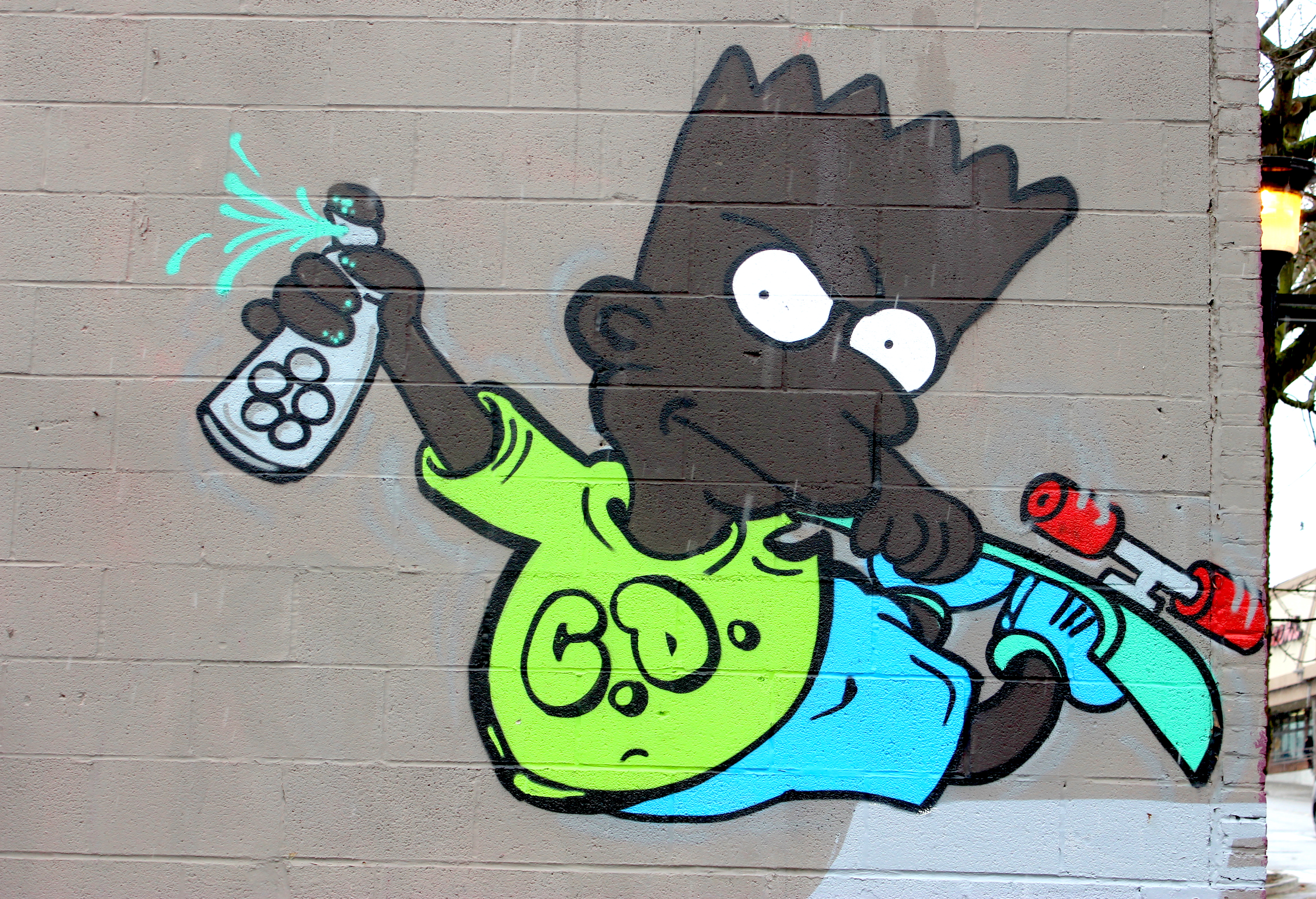Celestial clocks tick away in the background on the eponymous opening track of Midday Veil’s new LP, The Current. Lead singer Emily Pothast coos about serpents and muses about the nature of perception. Heady, yes. But also, imminently danceable. Produced by textural wunderkind Randall Dunn, the album’s funky ass bass grooves and synth warbles weave their way in and out of wide, barren vistas. The album sounds like the house music at an occult night club, full of Dionysian spectres and banshees. In the coda off the album’s single, “Choreia” the sound of ghosts being violently vacuumed up into the void swirls on top of a stop and start krautrock groove. Midday Veil toy with space more on the new LP, leaving room for atmospherics to bubble up from the cosmic goop underneath.
Levitating comfortably above the excellent, completed new album, Midday Veil are poised to hypnotize at tomorrow’s Chop Suey LP release show. Performing with fellow trance-inducers Master Musicians of Bukkake (of which The Current producer Randall Dunn is a member) there is a 90 percent chance you will achieve transcendency at the performance.
Seattle Weekly sat down with Midday Veil around a campfire in Pothast and synth player David Golightly’s backyard to talk about The Current:
Emily Pothast (Lead Singer): There were a lot of things on this album that were sort of born in the studio.
Seattle Weekly: The album is full of textural stuff that I feel like would be difficult to replicate live.
EP: Yeah, David’s been figuring it out. He does synths, and he’s been loading up these samples and things where, when he’s dialed in right, he can basically play like 20 instruments at a time.
David Golightly (Synths): I think you have to figure out what are the core, most important basic elements of the song, and then once you have those bases covered you just add things one by one, even if you don’t get as many layers as are on the record. I think that a lot of the stuff we are playing now, what it has in common is a lot more space anyways, so I think it serves it not to be too filled in.
SW: Do you guys imagine The Current taking place anywhere? With all the space and textures you are doing on the record, it almost seems like the soundtrack to its own little world or something.
EP: I think that it takes place in the world of making the album in the studio actually.
DG:
(Laughs)
EP: That’s the world where it’s happening. Everything was recorded at Avast, which is Randall’s studio, and he produced and mixed everything. He had a lot to do with making sure everything sounded like different planets in the same universe or solar system or something. He made everything feel related but different, if that’s what you mean.
SW: When I listened to the album, it reminded me of a lot of the atmospheric stuff he did on Wolves in the Throne Room’s Celestial Lineage. He seems good at getting that going. What was it like working with him?
DG: I feel like he’s really spontaneous in the studio. He is really confident with the gear that he works with, he knows it inside and out. It frees him up to be really kind of playful with the treatment of sounds. He gets to know the material before he goes in and gets a feel for the kind of vibe it wants. It may not necessarily even be what you expected it was going to be when you go in there, which is really cool because he’ll bring out an entirely new dimension by trying stuff out you would never think of.
SW: Well like what? Was there a particular song on the album you brought to him and he was like ‘Let’s try this’ and you all were like “Whoaaaaaaaaa?”
EP:
(Laughs) Well, there was a lot of stuff we brought in that we had already recorded that actually didn’t end up on the album. In the process of trying to get them right, he was just like, “There needs to be more on this.” Like the song, “The Current.”
Timm Mason (Guitar): That was conceived mostly in the studio.
SW: Is that unusual for you guys?
TM: It was. I think some of the more recent stuff we’ve been working on started in studios just because we’ve had time in there. On our most recent tour we stopped in a studio to record.
EP: We’ve put out records that are just sort of documents of improvisation. We have this history of liking to go into a place, and setting up and going “I want the room to be like this.” I like to have a corner where I can have things bouncing off and set delays and then loop it, vocals and percussion and stuff. Really long loops, like a minute long, so by the time it comes back, it has transformed by then. We have this kind of logic with how we do improvisations. All of us approach the instruments differently. In the studio on the new album, we didn’t necessarily go into it with that sound environment for improvisation, but we all went into it with that experience that we’ve had for years. So you know, there are jams that come up in rehearsals. Songs like “The Current” were something our drummer and bassist just jammed out, and then it came to me in the studio without having had anything to do with it. I just wrote melodies and lyrics on top of it.
SW: What is that like? I feel like with your band and a lot of other bands on Translinguistic Other (Pothast and Golightly’s record label) there’s this sort of larger concept you all are getting at. This sort of… idea of destroying the ego, or metaphysics or something. Does the music usually inform that sort of lyrical content or subject matter, or vice versa?
EP: A lot of it is about sort of like…oh God. I mean. It’s poetic or whatever. The words are better than what I’m about to say. But just like… the idea of perception, and the gap between experiencing something and then comprehending it, or making it into a story. There’s always this sort of gap or disconnect between sensory input and the making of meaning.
SW: Well, give me an example.
EP: Well, I mean, just in consciousness. In the apparatus, you can’t be experiencing, like “This is this right now,” and then also be experiencing the past or the future and making a story or an experience. There’s like this flexibility of mind. (Laughs) That has this sort of, like, a geometric or physiological presence. It’s like rooms in a house, or exploring a landscape or an environment that’s about the nature of perception. (Laughs) I don’t know. That’s what I’m interested in. [Argentinian author Jorge Luis] Borges is a good touchstone on what I’m talking about, he wrote a lot about perception. He wrote a lot of short stories that have little metaphysics and labyrinths.
SW: Is that something you all share? Sort of this metaphysical basis for this band? The whole idea of Midday Veil as this entity, I feel like you sort of represent this metaphysical way of thinking about the world. Like your shows, you all seem to go into this sort of trance like ritual from the improvisational nature of it all.
TM: I guess the answer might be a little different for everybody. I think about that stuff. I have different angles on it. I’m someone who doesn’t notice words in songs as much as sounds and textures. But I still feel like I’m trying to bring this sort of abstracted, experiential element to the sound making process. You know, you were talking about trance, using sounds to kind of help people get into this different mental state. That’s all definitely a part of it for me.
Click here for details on Thursday’s Midday Veil LP release party with Master Musicians of Bukkake at Chop Suey








